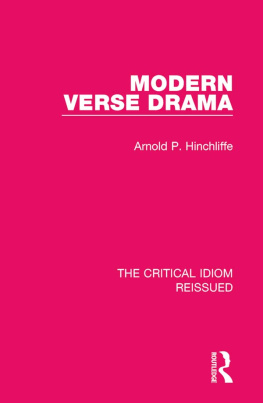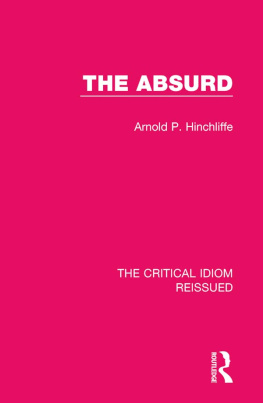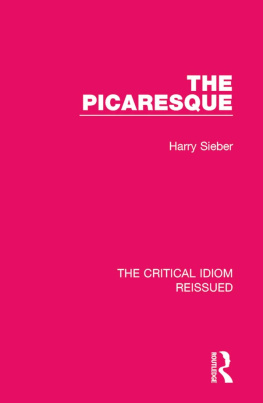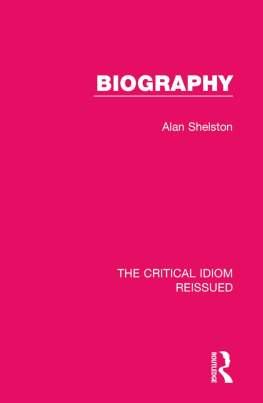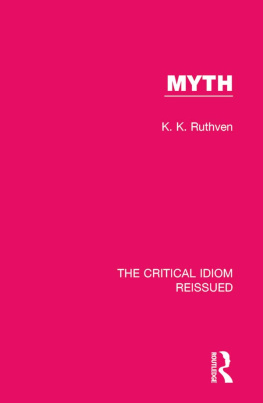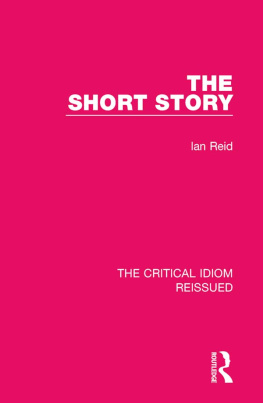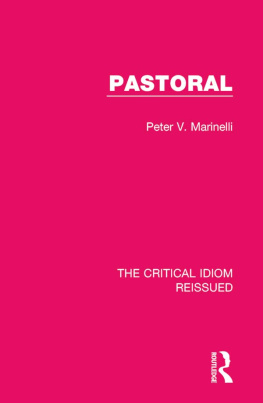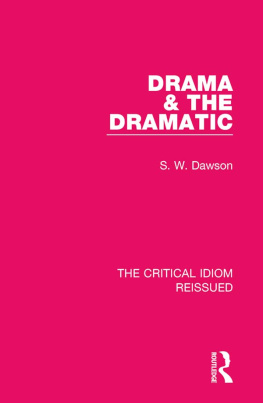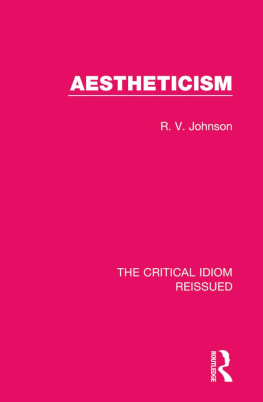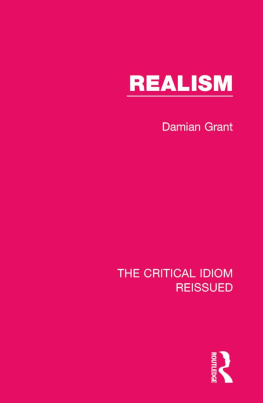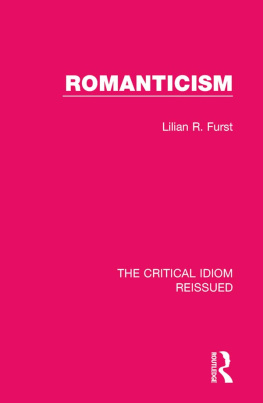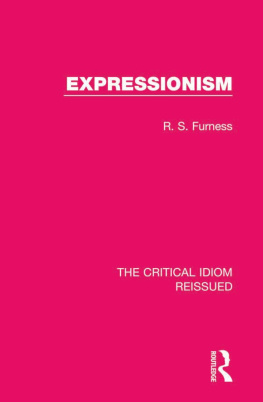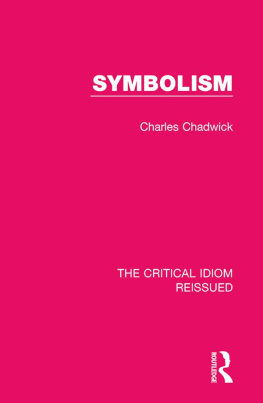Table of Contents
Guide
Print Page Numbers
THE CRITICAL IDIOM REISSUED
Volume 33
MODERN VERSE DRAMA
MODERN VERSE DRAMA
ARNOLD P. HINCHLIFFE
First published in 1977 by Methuen & Co Ltd
This edition first published in 2018
by Routledge
2 Park Square, Milton Park, Abingdon, Oxon OX14 4RN
and by Routledge
711 Third Avenue, New York, NY 10017
Routledge is an imprint of the Taylor & Francis Group, an informa business
1977 Arnold P. Hinchliffe
All rights reserved. No part of this book may be reprinted or reproduced or utilised in any form or by any electronic, mechanical, or other means, now known or hereafter invented, including photocopying and recording, or in any information storage or retrieval system, without permission in writing from the publishers.
Trademark notice: Product or corporate names may be trademarks or registered trademarks, and are used only for identification and explanation without intent to infringe.
British Library Cataloguing in Publication Data
A catalogue record for this book is available from the British Library
ISBN: 978-1-138-21971-7 (Set)
ISBN: 978-1-315-26975-7 (Set) (ebk)
ISBN: 978-1-138-28397-8 (Volume 33) (hbk)
ISBN: 978-1-315-11530-6 (Volume 33) (ebk)
Publishers Note
The publisher has gone to great lengths to ensure the quality of this reprint but points out that some imperfections in the original copies may be apparent.
Disclaimer
The publisher has made every effort to trace copyright holders and would welcome correspondence from those they have been unable to trace.
2017 Reprint
Acknowledgements
Extract from The Ascent of F6 by W. H. Auden and Christopher Isherwood, Copyright 1936 W.H. Auden, renewed.
Extract from Waiting for Godot by Samuel Beckett, used by permission of Faber and Faber Ltd; also used by permission of Grove/Atlantic, Inc., copyright 1954 by Grove Press, Inc.; Copyright renewed 1982 by Samuel Beckett. Any third party use of this material, outside of this publication, is prohibited.
Extracts from The Complete Poems and Plays by T. S. Eliot, used by permission of Faber and Faber Ltd.; also used by permission of Houghton Mifflin Harcourt Publishing Company. Collected Poems 19091962 by T.S. Eliot 1936 by Houghton Mifflin Harcourt Publishing Company. Copyright renewed 1964 by Thomas Stearns Eliot. All rights reserved.
Extracts from The Dark is not Light Enough (1949), A Phoenix too Frequent (1949), The Ladys not for Burning (1949), The Firstborn (1950), Curtmantle (1961) by Christopher Fry, used by permission of Oxford University Press.
Modern Verse Drama
Arnold P. Hinchliffe
First published 1977
by Methuen & Co Ltd
11 New Fetter Lane London EC4P 4EE
1977 Arnold P. Hinchliffe
ISBN 0416 83250 4 Hardback
ISBN 0416 83260 1 Paperback
This title is available in both hard and paperback editions. The paperback edition is sold subject to the condition that it shall not, by way of trade or otherwise, be lent, re-sold, hired out, or otherwise circulated without the publishers prior consent in any form of binding or cover other than that in which it is published and without a similar condition including this condition being imposed on the subsequent purchaser.
Distributed in the USA by
HARPER & ROW PUBLISHERS INC
BARNES & NOBLE IMPORT DIVISION
for GIOVANNI
Contents
The volumes composing the Critical Idiom deal with a wide variety of key terms in our critical vocabulary. The purpose of the series differs from that served by the standard glossaries of literary terms. Many terms are adequately defined for the needs of students by the brief entries in these glossaries, and such terms do not call for attention in the present series. But there are other terms which cannot be made familiar by means of compact definitions. Students need to grow accustomed to them through simple and straightforward but reasonably full discussions. The main purpose of this series is to provide such discussions.
Many critics have borrowed methods and criteria from currently influential bodies of knowledge or belief that have developed without particular reference to literature. In our own century, some of them have drawn on art, history, psychology, or sociology. Others, strong in a comprehensive faith, have looked at literature and literary criticism from a Marxist or a Christian or some other sharply defined point of view. The result has been the importation into literary criticism of terms from the vocabularies of these sciences and creeds. Discussions of such bodies of knowledge and belief in their bearing upon literature and literary criticism form a natural extension of the initial aim of the Critical Idiom.
Because of their diversity of subject-matter, the studies in the series vary considerably in structure. But all authors have tried to give as full illustrative quotation as possible, to make reference whenever appropriate to more than one literature, and to write in such a way as to guide readers towards the short bibliographies in which they have made suggestions for further reading.
John D. Jump
University of Manchester
This brief study is in no way intended to replace, or compete with, Denis Donoghues work on modern verse drama, The Third Voice, but it did start with a doubt raised by that work. It seemed to me that the chapter on Christopher Fry while sober and accurate in terms of drama was less than fair in terms of theatre, and even verse drama should struggle towards existence in that impure space called the stage. In fact the book which proved most useful to this study was George Steiners The Death of Tragedy which, in spite of its title and subject, comes nearer the problems of verse in our modern theatre than Donoghues work.
The study has been a fascinating journey involving drama and theatre in a very wide way, but I have tried to resist the interesting side-tracks as far as possible. Of course it could be argued that verse drama in these days is only a cul-de-sac and that to treat it seriously at all requires faith in spite of the facts. The value of verse in the modern theatre is certainly doubtful, and must be strenuously maintained or unscrupulously redefined. Fortunately, in a history, faith and fact can often live happily together and particularly when it becomes clear that verse drama was not a cul-de-sac, but rather a long way round, with picturesque scenes on the way.

